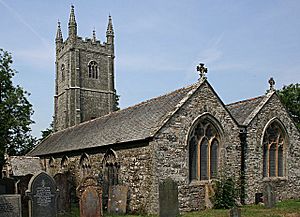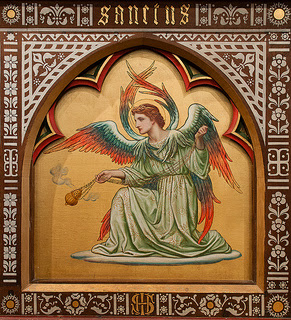St Ladoca's Church, Ladock facts for kids
Quick facts for kids St Ladoca’s Church, Ladock |
|
|---|---|

St Ladoca’s Church, Ladock
|
|
| Lua error in Module:Location_map at line 420: attempt to index field 'wikibase' (a nil value). | |
| Location | Ladock |
| Country | England |
| Denomination | Church of England |
| History | |
| Dedication | St Ladoca |
| Administration | |
| Parish | Ladock |
| Deanery | Powder |
| Archdeaconry | Cornwall |
| Diocese | Diocese of Truro |
| Province | Province of Canterbury |
St Ladoca's Church, Ladock is a very old and important church. It is a Grade I listed building, which means it's protected because of its special history and architecture. This church is part of the Church of England and is located in Ladock, a village in Cornwall, England.
Contents
History of St Ladoca's Church
The church of St Ladoca has a beautiful tower on its west side. This tower is made from strong granite blocks. The northern part of the church was built a long time ago, in the 13th century. The southern part, called the south aisle, was added in the 15th century.
Church Restoration in the 1860s
The chancel, which is the area around the altar, was greatly repaired and changed between 1862 and 1864. A famous architect named George Edmund Street led this work. The company that did the building was Messrs Bone from Liskeard. This big restoration project cost about £2,000 at the time.
Most of the church walls were rebuilt during this time. An old gallery inside the church was removed. Parts of the roof were also replaced. The frames and decorations around the windows were made from Ham Hill stone.
New wooden seats were put in, made from stained deal wood. These seats had carved ends and were covered with soft scarlet carpet. A new pulpit was also added. It was made of stone and wood, with dark pitch pine and shiny ebony parts. The stone base was made by Clarke of Bath. A new, low oak screen was built to separate the main part of the church from the chancel.
Stained Glass Windows and Art
The chancel was made even better in 1863 with a new stained glass window at the east end. This window was created by Morris, Marshall, Faulkner & Co. from London. It showed different women named Mary from the New Testament. The middle part showed Mary, the sister of Lazarus.
More windows by the same company were added in 1869-70 and 1897. These windows had designs by famous artists like Edward Coley Burne-Jones and Ford Madox Brown. Experts say these windows are "the best display of Morris & Co. glass in Cornwall." William Morris, who founded the company, had learned from G. E. Street. This church project was their first time working together professionally.
The floors in the aisles were covered with square tiles of Portland stone. These were placed diagonally with black and red tiles. The chancel floor had colorful encaustic tiles mixed with Portland stone.
The reredos, which is a screen behind the altar, was also special. It had dark encaustic tiles on the sides and carved alabaster in the middle. A polished serpentine stone was used for the super-altar. It had a painted front created by Edward Arthur Fellowes Prynne. In the very center of the reredos, a large cross made of Irish marble was set into the design.
Other Interesting Features
The church has other cool things to see. There's a beautifully carved base of the rood screen. A rood screen is a special screen that used to separate the chancel from the rest of the church. The font, which is a basin used for baptisms, is made from Catacleuse stone.
The church traditionally celebrates a special day, called a feast, on the Sunday after the first Thursday in January.
Parish Status
St Ladoca's Church is part of a group of churches. It shares a parish with:
- St Crida's Church, Creed
- St Nun's Church, Grampound
- St Probus and St Grace's Church, Probus
- St Hermes' Church, St Erme
Church Bells
In 1883, a new set of six bells was put into the church. These bells were made by Taylors of Loughborough. They replaced three older bells. The older bells were from 1870, 1743, and one from the time of King Charles II. The new bells were made using the metal from the old ones. They were in the key of G, and the largest bell weighed about 12 cwt (hundredweight). In 1926, two more smaller bells were added, making a total of eight bells.
Church Organ
The church has an organ made by Henry Willis. You can find more details about this organ on the National Pipe Organ Register.
 | Delilah Pierce |
 | Gordon Parks |
 | Augusta Savage |
 | Charles Ethan Porter |


